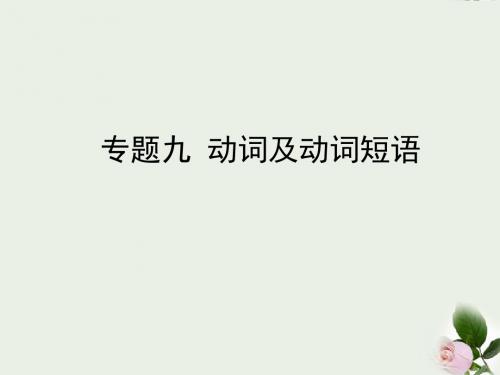精品中考英语专题讲解 第9讲动词的时态和语态
中考英语总复习专题九动词及动词短语课件

⑥in短语 arrive in 到达
call in 拜访
believe in 信任;信赖 hand in 交上;提交;呈 送 join in 参加(=take part
或沮丧
write down 写下;记 下
in)
⑦off短语
keep off 避开;让开 clean…off 把……擦掉
⑧about短语 think about 考虑 care about 关心;在意 talk about 谈论;讨论;议论 worry about 担心;烦恼
take in 吸入;吞入(体内)
飞
take off 脱下(衣服等);起
take up 从事(工作、兴趣爱好等);着手处理
⑥turn短语 turn on 打开 turn off 关掉 turn out 结果是
turn up 调高(声音)
turn over 翻身;翻转 turn down 调低(声音) turn around 转身;调头
调查
⑬of短语 hear of 听说 think of 思考;考虑
⑭over短语
fall over 绊倒
⑮to短语 belong to 属于
listen to 听……
stick to 坚持;固守 talk to 跟……说 add…to 把……加到……上 lead to 导致;通向
lend…to… 借……给……
put down 记下;镇压
put into 把……放进;使进入 put on 穿上(戴上);上演;增加(体重) put up 张贴(广告等);搭建;举起
②look短语 look at 看 look for 寻找
look after 照顾
look through 浏览 look up 查找;查询 look around 向四周看
中考英语语法复习课件:(九)动词的时态和语态共70页文档

•
26、我们像鹰一样,生来就是自由的 ,但是 为了生 存,我 们不得 不为自 己编织 一个笼 子,然 后把自 己关在 里面。 即使延续时 间再长 ,也还 是没有 制约力 的。— —爱·科 克
•
28、好法律是由坏风俗创造出来的。 ——马 克罗维 乌斯
Thank you
•
29、在一切能够接受法律支配的人类 的状态 中,哪 里没有 法律, 那里就 没有自 由。— —洛克
•
30、风俗可以造就法律,也可以废除 法律。 ——塞·约翰逊
时态和语态
6、最大的骄傲于最大的自卑都表示心灵的最软弱无力。——斯宾诺莎 7、自知之明是最难得的知识。——西班牙 8、勇气通往天堂,怯懦通往地狱。——塞内加 9、有时候读书是一种巧妙地避开思考的方法。——赫尔普斯 10、阅读一切好书如同和过去最杰出的人谈话。——笛卡儿
【夺分天天练】2014中考英语总复习 专题9 动词的时态与语态课件(含13年试题) 牛津版

中考透视 ( C )1. [2013· 内江] Though he ________ the book three times, he hopes to read it again. A. read B. reads C. has read D. would read [ 解析 ] 根据“ three times” 可知“他把这本书读了三 遍”,所以要用过去完成时,表示过去的动作对现在 造成的影响,所以选C。 ( A )2. [2013· 青岛] The astronaut is so tired that he ________ for eleven hours. A. has been asleep B. has fallen asleep C. has gone to bed D. has gone to sleep 专题9┃ 动词的时态与语态
专题9┃ 动词的时态与语态
5.在由if引导的条件状语从句中,如果主句用过去将来时 态,if从句需用一般过去时代替过去将来时。如: Amy said that she would go shopping if it didn't rain the next day. 艾米说过如果第二天不下雨,她就去购物。 6.have been to 和have gone to的区别 两者后均可接地点,前者表示“去过某地(已经回来)”,通 常可与表示次数的状语连用;后者表示“到某地去了 ( 还 未 回来)”,强调说话的当时去某地的人不在场。如: He has gone to Paris.他去巴黎了。 He has been to Paris three times.他去过巴黎三次。 专题9┃ 动词的时态与语态
3 动词的语态 语态是动词的一种形式,它表示主语和谓语的关系。 语态有两种:主动语态和被动语态。如果主语是动作的 执行者要用主动语态;如果主语是动作的承受者,则用 被动语态。 常用的五种被动语态结构及示例如下表所示:
2020届中考英语 第9讲 动词的时态和语态课件 (共60张PPT)

【典题】
( )1.(2019 年淮安)—What is your mother doing, Linda?
—She ________ dinner in the kitchen now.
A.is cooking
B.was cooking
C.cook
D.cooking
答案:A
( )2.(2019 年上海)Look! They _______ about the solution
A talk C.was talking 答案:C
B.am talking D.talked
( )5.(2019 年镇江)—Oh! What's wrong with your finger?
—I hurt it while I ________ a model plane.
A.made C.am making 答案:B
live—lived
like—liked
move—moved (3)以一个辅音字母结尾的重读闭音节动词,双写该辅音字
母,再加-ed。如:
drop—dropped
stop—stopped
plan—planned
(4)以辅音字母加 y 结尾的动词,应变 y 为 i 再加-ed。如:
carry—carried cry—cried
3.动词第三人称单数变化方法与名词变复数相同。 (1)一般情况直接加-s。如:
stop—stops
look—looks
read—reads (2)以 s, x, ch, sh, o 结尾的动词加-es。如:
miss—misses watch—watches
fix—fixes wash—washes
中考英语 语法精讲精炼 第9讲 被动语态课件

The windows of our house are cleaned once a
week. 我们房子的窗户一星期擦一次。(肯定句)
→The windows of our house aren’t cleaned once a week.(否定句,在is,am,are后加not)
→Are the windows of our house cleaned once a week?(一般疑问句,把is,am,are提句首)
2.一般过去时的被动语态(主语+was/were+done)
Beijing was liberated in January,1949. 北京是一九四九年一月解放的。(肯定句)
____1____to an end,you think about the new
year and all the ways you want to improve your life.But as you start to write down your hopes for the new year,you think about the last year.You excitedly write down all the changes
the world. 世界上越来越多的人说汉语。(强调汉语的使用 广泛) (4)句子的主语是动作的承受者。如:
Many houses were pulled down by the earthquake.许多房屋被地震摧毁了。
考点2.初中阶段主要掌握的几种被动语态 1.一般现在时的被动语态(主语+am/are/is+done)
专题09+动词的时态和语态【复习课件】-2023年中考英语二轮复习讲练测

• ★用法
用法
例句
Millions of people visit the Great 1. 表示现在经常性或习惯性的动
Wall every year.每年有数百万人参 作或存在的状态。
观长城。
Our teacher told us that light travels 2. 表示客观真理、科学事实及俗
come/go
be here/ there
finish die
be over be dead
marry join
be
be
married in
• 【易混辨析】(1)一般过去时和现在完成时
• 一般过去时:表示过去发生的动作或状态,与现在无关;现在 完成时:表示过去发生的某一动作对现在造成的影响或结果,强调 现在的情况。
一
般 构成:①will/shall+动词原形 ②am/is/are going to+动词原形
将 来
时间标志词:tomorrow, the day after tomorrow, next week/
时 month/year, in+一段时间(如:in two days), in the future等
much faster than sound.我们的老 语。
师告诉过我们光比声音传播得快。
用法
例句
3. 在when, as soon as, before等引 Turn off the lights before you leave
导的时间状语从句和if, unless等 home.出门前记得关灯。
2. 表示过去的习惯性动作或经常 when she was in the primary
人教版中考英语语法点击【9】动词的时态与语态(65页)PPT课件
2.非延续性动词come, go, leave, start, finish等常 用其进行时表达将来之意。如:
I am leaving for Japan tomorrow. 明天我要动身前往日本。 3.“be going to+动词原形”也可表示根据已有迹象,判 断可能要发生的情况。如: Look at the black clouds! It is going to rain. 看那些乌云!马上要下雨了。
do 或 will/shall do month等
过去将来时
was/were going to do 或 would do
the next day等
专题 9 动词的时态与语态
现在进行时 过去进行时
现在完成时 过去完成时
am/is/are doing
now, these days 等
was/were doing
at this time yesterday, at that time, when引导的时间状语从句等
has/have done
already, yet, ever, never,just, before,once, twice, so far, for three days, since two days ago, recently等
go-goes fix-fixes
专题 9 动词的时态与语态
1) e再加ing
现在分词 3)以重读闭音节结尾且末尾只有 一个辅音字母的词,先双写该辅 音字母,再加ing
4)少数以ie结尾的词要变ie为y, 再加ing
talk-talking read-reading
专题 9 动词的时态与语态
4.在现在完成时中,如果有持续的时间状语,要把非延续 性动词变为延续性动词。常用的非延续性动词变延续性动词如 下表:
动词的时态和语态-PPT课件
9. The boys __w_e_r_e_p_l_a_y_in_g___ (play) basketball from 5:00 to 6:00 yesterday.Βιβλιοθήκη .19练习
.
20
用所给动词的正确形式填空: 1. She _l_e_ft__ (leave) the office two
hours ago. 2. As son as she arrived home, the girl
discovered that she _h_a_d__t_a_k_e_n__ (take) her friends book by mistake. 3. Who _c_o_m__e_s__ (come) to school earliest in your class every morning? 4. Great changes _h_a_v_e_t_a_k_e_n_p__la_c_e__ (take place) in this city since 1979. 5. By the time he was twelve, Edison _h_a_d__b_e_g_u_n_ (begin.) to sell newspape21rs.
I’ll go to see you when I have time. I’ll go to see you if I have time tomorrow. 2. 某些动词,如:stand, continue, wish, love, like, hate, feel, find, think等常用一般现在时态
动词的时态和语态
第九讲动词的时态和语态Ⅰ动词的时态英语中不同时间和方式发生的动作或状态时要用谓语动词的不同形式来表示,这种表示动作或状态发生时间和方式的形式称作动词时态。
一一般现在时一般现在时主要用来表示每天、每周等经常一直如此,长期进行下去的动作,其着眼点不在描述具体的动作,而是通过提出不断反复的动作,来说明某一真理或某一经常性习惯性的举动。
一般现在时的几种主要用法。
1)一般现在时表示客观事实、客观存在的普遍真理、用于一般现在时的时间状语常见的有:often,usually,always,sometimes,seldom,ever,never,everyday(week,month,year,) once a year,now and then,from time to time.Eg:The earth moves around the sun.Shanghai lies in the east of China.2)表示格言或警句。
Eg:Pride goes before a fall.(骄者必败)注意:此用法如果出现在宾语从句中,即使主语是过去时,从句谓语也要用一般现在时。
Eg:Columbus proved that the earth is round.3)表示现在习惯的、经常重复的或定期发生的动作或存在的状态。
Eg:I leave home for school at 7 every morning.We go to school every day except on Sunday.4)表示能力、性格、个性等。
Eg:I do not know so much.Ann writes good English but does not speak English well.注意:1)表示“感觉”“状态”或“关系”的动(如:be ,like,love,hate,want,think,remember,find,sound,forget, Refuse,see,allow,prove,have,matter,taste,look,feel)常用一般现在时,不用现在进行时。
中考英语动词时态、语态、(课件)详解
★现在进行时的用法:表示说 话时或现阶段正在进行或发 生的动作,
常与时间状语now, this week, these days 等连用。另外,我们还要注意 句中的隐含条件(如:look, listen, It’s nine o’clock等)。如: ★Look !The students are doing their
(对画线部分提问)
Ho__w___lo__n_g__ _d__id_Tom
w__a__t_c_h_TV?
9. She helped me do some cleaning.
W(_对h_a_画_t_线_d部__i分d__提Sh问e _)h__e_l_p you_d__o_ ?
四、一般将来时
1、一般将来时的构成: 1)will + 动词原形 2)am(is,are) going to +动词原形 3)常用be doing表示将来的动词go come leave stay,
断无关时 • The sun will rise at 6:30 tomorrow moring
1. There_w__i_ll__b_e_2(0b1e6)实a战n E演n练glish film on
TV tonight.
2S. _h_a_l_lwe_g_o_( go) to the park next Sunday?
the piano in the room. 3.The students of Class Twaore__w_o_r_k_i_n_g
(work) on the farm now. 4.Be quiet ! Your father__is_s_l_e_e_p_in_g___
- 1、下载文档前请自行甄别文档内容的完整性,平台不提供额外的编辑、内容补充、找答案等附加服务。
- 2、"仅部分预览"的文档,不可在线预览部分如存在完整性等问题,可反馈申请退款(可完整预览的文档不适用该条件!)。
- 3、如文档侵犯您的权益,请联系客服反馈,我们会尽快为您处理(人工客服工作时间:9:00-18:30)。
第9讲动词的时态和语态()1.He almost fell down.But he ________.(2015年张家界)A.didn't B.doesn't C.won't()2.—Hurry up! It's time to go.—OK.________.(2015年泸州)A.I'm coming B.I'd come C.I've come D.I come()3.Her son ________ the army for two months.She misses him very much.(2015年淮安)A.has joined B.has been in C.joined D.was in()4.I ________ the book club last week and I ________ two books already.(2015年新疆)A.join; read B.joined; read C.joined; have read D.joined; has read()5.Now it's much easier to shop online.When your order is ready, the things you want to buy ________ to you soon.(2015年河南)A.send B.were seen C.are sending D.will be sent()6.—How often do I need to feed the dog?—It ________ food every day, or it will be hungry.(2015年孝感)A.must give B.must be give C.must gave D.must be given()7.That's our new school.It ________ last year.(2015年泸州)A.built B.is built C.was built D.will be built()8.Every day, too much water ________ in our school.We should save it.(2015年黔南) A.is wasted B.wastes C.was wasted D.wasted()9.________ this kind of question often asked in your class, Ann? (2015年张家界) A.Is B.Does C.Has()10.I wonder when Subway II in Harbin ________.When the day comes, I'll spend less time going to school every day.(2015年哈尔滨)A.is finish B.will be finished C.was finished()11.Look, some boys ________ kites in the park.(2015年吉林)A.fly B.are flying C.flew()12.—What ________ Candy ________ just now?—Sorry, I didn't hear it.I ________ up the phone.(2015年鄂州)A.was...saying; was picking B.did...say; was pickingC.does...say; am picking D.did...say; pick()13.—I'm sorry to have kept you waiting long.—Never mind.I ________ here for only a few minutes.(2015年鄂州)A.came B.have been C.have come D.had come()14.—Where is your mother?—She ________ Guiyang.(2015年铜仁)A.has gone to B.has been to C.has been in D.went to()15.—Where are the flowers?—You see, someone ________ them to the window.(2015年武汉)A.moves B.had moved C.has moved D.would move()16.—John, I called you yesterday morning, but nobody answered the phone.—Oh, I ________ basketball at that time.(2015年郴州)A.play B.playing C.was playing()17.—When ________ you ________ the new bike?—I ________ it for 2 days.(2015年恩施)A.did, have; bought B.did, buy; have hadC.did, buy; have bought()18.—Have you finished the poster for the party?—Not yet.I ________ it in two days.(2015年山西)A.finish B.finished C.will finish()19.I ________ the shops.Can I get you anything? (2015年河北)A.go to B.went to C.have gone to D.am going to()20.—Your scarf feels soft.Did you buy it in China?—No, I bought it in France.But it ________ in China.(2015年昆明)A.is making B.was made C.makes D.made()21.Teenagers should ________ to take care of themselves from a young age.(2015年临沂)A.educate B.be educating C.have educated D.be educated()22.When you ________ a difficult task, try to continue with it and finish it.(2015年沈阳)A.give B.are giving C.gave D.are given()23.Tourists' bad behavior ________ by the government in our country from now on.(2015年陕西)A.will record B.will be recorded C.records D.is recorded()24.Mr.Zhang and his wife ________ to the party last Sunday.(2015年茂名)A.invited B.was invited C.were invited()25.—My aunt ________ me to Europe for vacation next month.—Have a good time! (2015年海南)A.take B.took C.will take()26.—May I speak to Mr.Black?—Sorry, he ________ Hong Kong.But he ________ back in a few days.(2015年随州)A.has been to; will come B.has gone to; will comeC.has been to; came D.has gone to; came()27.Many city people ________ their bikes to work every day.(2015年陕西)A.ride B.will ride C.rode D.have ridden()28.—Ben, why are you watching TV at this time? How about your homework?—I ________ all of it, Mom.I want to have a rest.(2015年漳州)A.finish B.am finishing C.have finished()29.Yu Qiuyu ________ us a wonderful speech in Guangyuan last month.We all learned a lot from it.(2015年广元)A.gives B.give C.gave()30.—Helen, when did you move here?—I ________ here since two years ago.(2015年南通)A.moved B.lived C.have moved D.have lived()31.—Will you go to see the movie The Left Ear with me tomorrow?—Sorry, but I ________ it twice.(2015年莆田)A.have seen B.saw C.will see()32.Alice ________ for the bus at seven yesterday evening.(2015年齐齐哈尔)A.waited B.was waiting C.is waiting()33.—________ Internet business ________ traditional business in the past few years?—Not really.(2015年宜昌)A.Does...beat B.Will...beat C.Has...beaten D.Is...beating()34.On my way home, I ________ an old man lying on the ground last night.(2015年绥化)A.see B.saw C.seen()35.Victor and Rick ________ Shanghai on business many times.(2015年绥化)A.have gone to B.have been to C.have been in()36.The boys in Class 3 ________ a maths class at nine o'clock yesterday morning.(2015年绥化)A.is having B.was having C.were having()37.—Has Mary ever visited Tower Bridge?—Yes.She ________ it two years ago.(2015年沈阳)A.visits B.visited C.has visited D.was visiting()38.—Mum, where is Dad?—He ________ flowers in the garden now.(2015年北京)A.planted B.plants C.will plant D.is planting()39.Her grandmother ________ for ten years.(2015年齐齐哈尔)A.died B.has died C.has been dead()40.—How happy the grandparents are!—Yes, they ________ for fifty years.(2015年眉山)A.have been married B.have married C.have got married D.married()41.—The TV program Voice of Youth is really great.—I think so.It ________ the hearts of lots of fans since it started.(2015年汕尾)A.lose and touch B.won and touchedC.has won and touched D.has lost and hit()42.—The radio says there will be a heavy storm in Mount Emei tomorrow.—Bad luck.I ________ to go there with my classmates.(2015年乐山)A.plan B.will plan C.planned()43.People who won't work should be made ________.(2015年张家界)A.work B.to work C.working()44.In this school, the students are asked ________ mobile phones.(2015年内江)A.not to use B.not using C.not use D.to not use()45.In order to make Dandong more beautiful, more trees and flowers ________ every year.(2015年丹东)A.will plant B.should plant C.should be planted D.must plant()46.You can't wear shoes inside this place.It ________.(2015年江西)A.doesn't allow B.isn't allowedC.hasn't allowed D.wasn't allowed()47.—Lily, will you go to Jenny's birthday party this Saturday?—I'm not sure.Because I ________ so far.(2015年泰安)A.haven't invited B.wasn't invitedC.haven't been invited D.will be invited()48.—Have you heard of the song Little Apple?—Yes.It ________ every morning when aged people do square dancing downstairs.(2015年广东)A.is played B.plays C.was played D.played()49.The 31st Olympic Games ________ in Rio de Janeiro (里约热内卢) of Brazil in 2016.(2015年汕尾)A.is held B.will hold C.will be held D.is going to hold()50.Many houses ________ by the earthquake and thousands of people were left homeless.(2015年广州)A.damaged B.were damagedC.were damaging D.are damaged第9讲1—5AABCD 6—10DCAAB 11—15BBBAC 16—20CBCDB21—25DDBCC26—30BACCD 31—35ABCBB 36—40CBDCA 41—45CCBAC 46—50BCACB。
